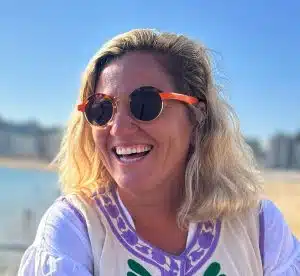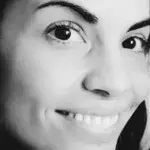SUSTAINABILITY | 03.12.2024
María Cortezo Castillo: an example of how being deaf doesn’t limit access to training and quality employment.
 Sometimes people with a disability can justifiably feel that the odds are stacked against them when it comes to getting a job and feeling fulfilled in terms of being economically active. Happily, this is not the case of María Cortezo, who, with 92% deafness, works alongside her colleagues in the MAPFRE Support and Resources team in the Canary Islands (Spain). MAPFRE’s commitment to diversity and inclusion, as set out in our Sustainability Plan 2024-2026, goes far beyond being mere words on a page.
Sometimes people with a disability can justifiably feel that the odds are stacked against them when it comes to getting a job and feeling fulfilled in terms of being economically active. Happily, this is not the case of María Cortezo, who, with 92% deafness, works alongside her colleagues in the MAPFRE Support and Resources team in the Canary Islands (Spain). MAPFRE’s commitment to diversity and inclusion, as set out in our Sustainability Plan 2024-2026, goes far beyond being mere words on a page.
More than 1,000 people with a disability make up part of MAPFRE’s workforce, 97.6% of them on permanent contracts, with more than 93% of them working full-time schedules. The Global Disability Program, implemented in more than 20 countries, includes measures to promote the full inclusion of people with a disability in the company and improve the quality of life of these people and their families.
After five minutes in María’s company, you see straight away that she is someone who is full of energy, spontaneous, and contagiously optimistic. We joined her on a video call to chat about her life and work. María was lip reading via MS Teams – her eyes are her ears. Although she has a cochlear implant, the operation was done when she was an adult, so adapting to sounds, which she does hear to a certain degree, is different from hearing persons. Through anecdotes and jokes, she told us about her time at MAPFRE and how she gets on with her colleagues.
Tell us a little about your career at MAPFRE
I started working as a customer adviser in Las Palmas, a position where I could have fun, learn, get to know more about this great company, fix day-to-day issues for customers, and grow personally and professionally. That lasted two years. Then I spent a while in the issuing and underwriting department, neither of which corresponded to my academic background (I have a degree in law degree and a Master’s in Human Resources), but did present me with a clear challenge – to show that, despite my deafness, I could work just as well as a hearing person, thanks to my other abilities.
In the position I’m in now – in the Resources Control and Support Area of the Canary Islands regional management (Spain) – my managers and supervisors are people who trusted me and gave me the opportunity to join a great team, encouraged me to always demand more of myself and helped me believe in my own abilities. And I have to say my colleagues are all excellent people – they never regarded me as being anything less than able and always treated me as an equal.
I have to say that I’ve grown a lot at a professional level during my time with MAPFRE.
«I’m 92% deaf and thanks to lip reading, I learned to speak before I learned signed language»
Tell us what a typical day is like for you. Who have been your most ardent supporters?
First off, just to be clear – I don’t like to talk about having a “disability”. I think of myself as a person with other capabilities. Personally, I don’t consider myself as a person with limitations. I think I can provide a different view of reality and I have other sensitivities when it comes to doing my work.
It’s very important to have support, for sure, and it has been like that for me. I went to the speech therapist twice a day – they’d take me out of school early so I’d get there on time. Continuous learning was the motto of the therapist that I was with until I finished my education. If I knew how to say “shoes” and had sandals on that day and didn’t use the right word, we had to start over. I’m still in touch with her today.
My sister had a very different childhood to me, because even though she was younger, she was older in the sense of having to deal with the difficulties of having a sister who didn’t hear. My grandfather passed on to me his love for horses and a passion for sport, and that was amazing because it was a place where being able to hear wasn’t important – it was just about enjoying yourself. And so I learned to compete, to win and to lose gracefully, and to achieve important goals like the Prince of Asturias gold medal for cadets in show jumping. My parents made a really big effort to support me in this, along with my uncles, cousins and friends. They’ve all been a great support in helping me become who I am today.
You communicate through lip reading. Don’t you speak sign language?
My parents decided that before I learned sign language, I should learn how to speak normally in order to communicate with society. They wanted to minimize any limitations I might face. So I had a life similar to my sister’s: school, friends, fun, sport, all of that. If I wanted something, I had to emit sounds, which at first were unintelligible, but which gradually, with practice, evolved into my first words. A little later, the phrases came along through reading the Harry Potter books, which introduced me to the world of reading.
Now I’m learning sign language and I’ve proposed to senior management that all employees learn the basics, especially in the sales network, because this would contribute further to the company’s social sustainability actions and help us be more empathetic to many customers.
What’s left for society to do in terms of boosting real inclusion?
I think that we need to promote greater awareness in general and specifically, more awareness of the needs of people with other abilities, as well as ensuring equitable access to education, employment and health services. You don’t need to look further than the topic of mobility in our cities to understand that blind people can’t get around as easily as I, a deaf person can, and enjoy what’s on offer.
The situation has improved, but there’s still a long way to go. Companies, for example, in the main, offer low-skilled jobs even though we’re highly trained individuals. Each and every one of us has to strive for excellence, with ourselves, at work, in our relationships, and seek to attain excellence as an individual in a society that’s only half prepared for people with other abilities.
«At MAPFRE, people with a disability can develop their careers in a respectful and inclusive environment.»
What would you highlight about MAPFRE’s performance in the area of integration?
It’s important to accept and assess disability, but also to work to overcome any obstacles that may arise along the way. With regard to integration at MAPFRE, I can honestly say that the company has shown a real commitment to the inclusion of people with a disability, offering job opportunities and training programs adapted to the needs of each employee. This has allowed people like me to develop professionally in an inclusive and respectful environment.
In addition, I’m very involved in the company’s volunteering activities – MAPFRE in the Canary Islands more than doubled its volunteering activity over the last year. Together, we’re learning to do something beyond just giving money, and that is to participate.
It’s very gratifying to be able to help that way. I encourage everyone to do it.
RELATED ARTICLES:


